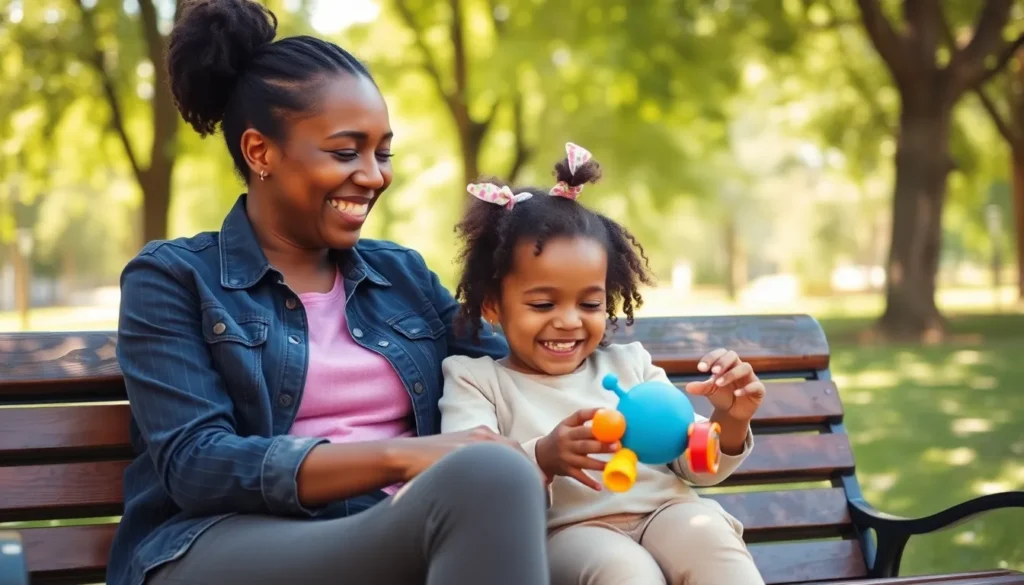Table of Contents
ToggleDivorce can feel like a tornado that uproots everything in its path, especially when kids are involved. Suddenly, parents find themselves navigating a new world of co-parenting, juggling schedules, and trying not to lose their sanity. But fear not! Parenting after divorce doesn’t have to be a chaotic circus act. With the right mindset and a sprinkle of humor, it can transform into a journey filled with growth and unexpected joys.
In this new chapter, parents can learn to embrace their roles with creativity and resilience. They can turn challenges into opportunities for bonding and laughter. So grab your favorite coffee mug, take a deep breath, and get ready to discover practical tips and insights that’ll make parenting after divorce not just manageable, but downright enjoyable. After all, who said co-parenting can’t come with a side of fun?
Understanding Parenting After Divorce
Navigating parenting after a divorce presents unique challenges. Parents encounter different emotional landscapes while striving for positive outcomes for their children.
The Impact of Divorce on Children
Divorce affects children in various ways. Emotional responses range from confusion to anger, often influenced by their age and personality. Younger children might struggle with understanding the separation, leading to feelings of insecurity. Older children frequently express anger or sadness as they process the changes. Academic performance often declines due to emotional distress. Emotional support from both parents plays a crucial role in their adjustment. Consistent communication provides clarity, helping children feel secure despite the changes in their family structure.
Coping Mechanisms for Parents
Coping mechanisms are essential for parents navigating their new reality. Open communication with children fosters an environment of trust and safety. Seeking support from friends or family members offers guidance during tough times. Engaging in self-care activities reduces stress, allowing parents to recharge emotionally. Developing a co-parenting plan emphasizes cooperation and minimizes conflict. Utilizing counseling or support groups can provide valuable insights and support networks. Staying positive and maintaining a sense of humor enhances resilience throughout the process.
Co-Parenting Strategies

Co-parenting after divorce requires effective strategies to ensure children’s well-being. Implementing practical approaches can lead to a more harmonious experience for everyone involved.
Communication Techniques
Open communication enhances co-parenting dynamics. Regular check-ins can help parents stay on the same page regarding the children’s needs. Utilizing tools like shared calendars helps manage schedules and commitments. Listening actively when discussing children fosters understanding and respect. Text messaging or emails offer additional channels for quick updates or important information. Establishing a tone that’s positive and supportive encourages cooperation. Keeping conversations focused on children’s welfare aids in reducing emotional tensions.
Establishing Boundaries
Clearly defined boundaries promote effective co-parenting. Parents should outline responsibilities to minimize confusion. Discussing rules for the children’s behavior in each household ensures consistency. Scheduling regular meetings to review the co-parenting plan helps both parties stay aligned. Moreover, respecting each other’s personal time supports individual growth. Agreeing on privacy guidelines regarding personal lives and the children fosters trust. Establishing boundaries also involves knowing when to seek outside help if disagreements arise, such as mediators or counselors.
Creating a Stable Environment
Creating a stable environment is essential for children adjusting to life after divorce. Parents can achieve this through consistency and a focus on safety.
Consistency in Routines
Maintaining consistent routines helps children feel secure. Regular meal times, bedtimes, and homework schedules provide familiarity amidst change. Parents can alternate schedules to ensure children adapt to both homes seamlessly. Communication about changes in routines remains vital. Transitioning between households becomes smoother when both parents coordinate. Children appreciate knowing what to expect day-to-day, which fosters a sense of stability and normalcy.
Safe Spaces for Children
Establishing safe spaces for children is critical for emotional health. Each parent should create designated areas where children can express feelings freely. These spaces can be cozy corners with favorite toys or calming music. Parents can encourage dialogue by actively listening and validating their children’s emotions. A predictable environment, filled with love and support, enhances resilience. Safety in both physical and emotional contexts allows children to explore their identities with confidence.
Navigating Emotional Challenges
Navigating emotional challenges during parenting after divorce involves recognizing and addressing both personal and children’s feelings. A balanced approach fosters a supportive environment for everyone involved.
Dealing with Personal Grief
Dealing with personal grief often emerges as a significant hurdle. Parents experience a range of emotions, including sadness and anxiety. Acknowledging these feelings is vital for healing. Engaging in self-reflection can help parents understand their emotional landscape. Seeking support from trusted friends or counselors offers an outlet for sharing experiences. Practicing self-care activities, like exercise or hobbies, boosts overall well-being. Establishing a routine helps create stability, allowing parents to focus on their children amidst the emotional turmoil.
Supporting Children’s Emotions
Supporting children’s emotions requires active engagement and empathy. Open communication lays the groundwork for expressing feelings. Allowing space for children to voice their thoughts and concerns fosters trust. Each child’s reaction varies based on their age and personality, so tailored approaches may apply. Younger children may benefit from play therapy, while older children often need more direct conversations. Validating their feelings helps children feel understood. Consistent reassurance provides comfort, aiding their emotional adjustment. Using techniques like storytelling to illustrate emotions encourages children to articulate their own experiences.
Parenting after divorce presents unique challenges but also offers opportunities for growth and connection. By focusing on open communication and emotional support, parents can create a nurturing environment for their children. Establishing routines and boundaries fosters stability, helping kids adjust to their new reality.
Embracing creativity and resilience allows parents to turn difficult moments into cherished memories. With the right mindset and support, co-parenting can transform into a rewarding experience, paving the way for healthier relationships and happier children. Ultimately, it’s about prioritizing the well-being of the kids while navigating this new chapter together.





